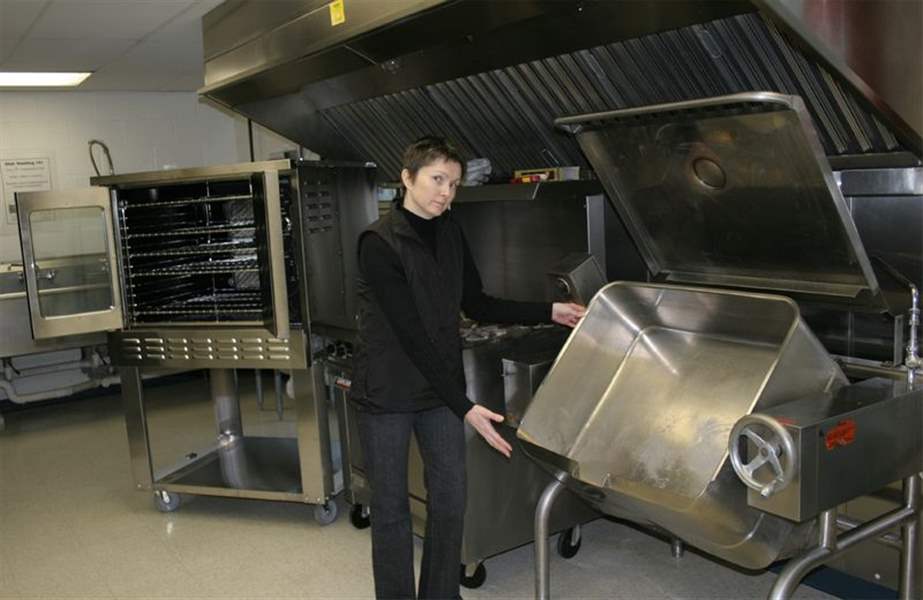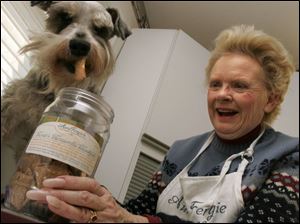
Kitchen near B.G. lets entrepreneurs season their ideas
12/19/2004
Co-manager Jenni Hirzel demonstrates the tilting brazier; at left is one of the two convection ovens.
long / blade

Janice Ferguson gives her dog Monte a sample of the canine snacks she makes at the cooperative kitchen.
HASKINS - One weekend a month Janice "Aunt Fergie" Ferguson hops into her car and heads to a low-rise building just north of Bowling Green with one thing on her mind: baking goodies for canines.
As a fledgling entrepreneur without the funds to build the licensed commercial kitchen she needs to make her Auntie Fergie's Gourmet Dog Treats, Mrs. Ferguson nonetheless is closer to one day becoming the queen of doggie delights, thanks to the Northwest Ohio Cooperative Kitchen.
The 2 1/2-year old kitchen, on State Rt. 582 about five miles north of Bowling Green, may be the solution for those who would like to take that secret family recipe and turn it into a commercial success.
In 2,400 square feet it has stainless steel prep tables, a commercial-size mixer, large kettles, a tilting brazier, two commercial-grade convection ovens, three large sinks, and large freezers for storage.
The kitchen, which is non-profit, was started about three years ago by the Wood County Agricultural Incubator Foundation. Funded largely by private donations, it rents for $20 an hour as long as users provide a business plan and proof of liability insurance.
But its key selling point is that it is U.S. Department of Agriculture-certified for commercial use and food safety.
"When I started my business I discovered my kitchen is not suitable, according to the Department of Agriculture. I own dogs and have carpeting, and that isn't allowed," said Mrs. Ferguson, who has been using the cooperative kitchen since August, 2003.
"I investigated putting another building on our property to build my own kitchen, but that would have been a horrible amount of money."

Co-manager Jenni Hirzel demonstrates the tilting brazier; at left is one of the two convection ovens.
Starting a small food business without a cooperative kitchen can run about $30,000, said Rebecca Singer, one of two managers of the cooperative kitchen and a program manager at the Center for Innovative Food Technology, which is one of four partners involved in the venture.
Without such a facility, an entrepreneur would need to pay to have his or her product tested for shelf stability and nutritional analysis, buy insurance for $1,500 to $2,000, pay a few hundred dollars for logo and label, and buy packaging for the ingredients, Ms. Singer said. "If you were trying to do it all on your own, it would be very expensive," she said.
The rent at the kitchen might not cover the cost of utilities, but sponsors prefer not to boost the charge because entrepreneurs usually are on tight budgets, she said.
The kitchen was created in 2002 when the Agricultural Incubator Foundation joined with the Ohio Agricultural Research and Development Center, the Ohio State University Agricultural Business Enhancement Center, and the Center for Innovative Food Technology, which is part of the EISC Inc. business and academic consortium. The foundation was started in 1999 with funds from the owners of Hirzel Canning Co. and Farms in Northwood.
The foundation owns the kitchen, equipment, and the building, which formerly was the H.J. Heinz Co. research station. The center was modeled after a food-business incubator that opened 10 years ago in Athens in southeast Ohio, Ms. Singer said.
The Athens center has been successful and is used daily by a local bakery and other entrepreneurs. By contrast, the Haskins kitchen has just three steady clients - Mrs. Ferguson, a company that makes nuts and martini olives, and a local caterer - who use it mostly on weekends.
However, the Haskins site has components that, given time, could help it become a true business birthing center, said Cameron Wold, an expert on food incubators who helped start the nation's most successful, the Denver Enterprise Center.
There are about 20 food industry incubators in the United States, each with several thousand square feet devoted to large-scale food production, according to the National Business Incubator Association in Athens, Ohio.
Each has strong connections to the food industry, business and product advisers, links to universities, and access to funds or investors willing to pour money into a solid idea.
The Denver incubator, for example, has 21 clients and has created 389 full-time or part-time jobs.
Community kitchens, which probably are double the number of incubators nationally but which are more likely to fail, are smaller, have few or no links to colleges or businesses, provide little expertise, and have no access to investors, said Mr. Wold.
He has written a book on kitchen incubators and conducted seminars on how to start them.
"The big dividing factor between the two is money," said Mr. Wold, a community resource developer at Boise State University in Boise, Idaho.
The Haskins kitchen is more community kitchen than incubator, but it has links to area businesses, including Hirzel Canning; can provide help for start-ups through the area's Small Business Administration office and EISC; and has ties to the University of Toledo and Ohio State University.
Its sponsors do not have an investment network, but try to prepare entrepreneurs who have products and a business plan to go to a bank when they are ready to expand.
The kitchen recently received a $64,000 business enterprise grant from the Ag Department to buy equipment next year. When the kitchen was started, the local incubator foundation provided about $30,000 to build it and obtain basic equipment.
Jenni Hirzel, the kitchen co-manager, said plans call for buying larger steam kettles, a device that fills jars quickly, and a labeling machine.
That would help Charlie Alter and Joe Spencer, owners of Frogtown Foods Inc., who use the kitchen to make spicy martini olives called J'Olives and cocktail nuts under the name Chuck's Nuts.
"Our products don't require using the kitchen all that much," said Mr. Alter. The kitchen allows them to make most of what they need in two or three days, he said.
But, if the two had to build their own kitchen and absorb the liabilities associated with production, they, like Mrs. Ferguson, would have had a sizeable investment without any way to know if they'd ever recoup it.
"What this has done for us is to get our production done quickly, efficiently, and rather inexpensively," Mr. Alter said. "Our biggest problem now is marketing and selling the product."
The kitchen's sponsors help advise entrepreneurs with marketing and selling, Ms. Singer said. About 60 budding entrepreneurs have contacted kitchen officials in its brief tenure, and some have used the kitchen to make test products.
The most common ideas from asquiring entrepreneurs, Ms. Singer explained, are barbecue sauces, salsas, and salad dressings, after family and friends say the idea is great. But many such products are on store shelves, so the problem for the entrepreneurs is making the new product stand out.
"They all tell us that their family and friends just love their product," she said. "Of course, the thing I ask them next is, 'Yes, they love it, but would they pay for it?' "
Contact Jon Chavez at: jchavez@theblade.com or 419-724-6128.